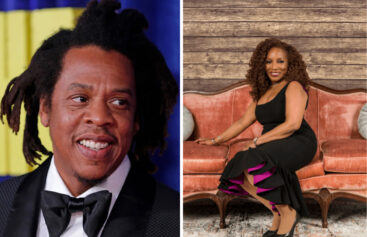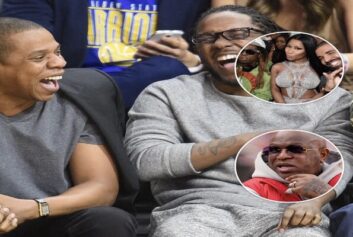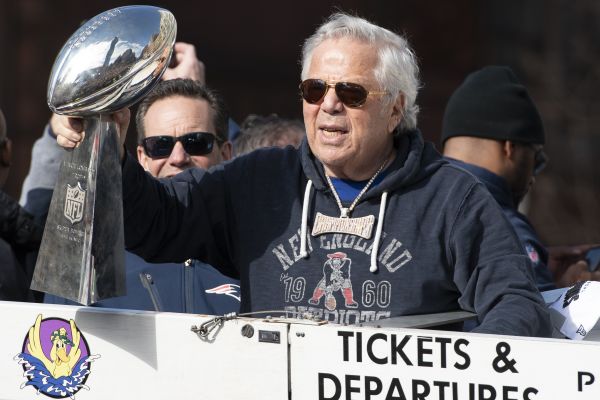Today marks the first day of Jay Z's controversial partnership with high-end retailer Barney's. And this month marks the 10th anniversary of the release of his Black Album. The triple platinum selling project was his eighth studio offering and was, at the time, alleged to be Shawn Carter's swan song from the rap game. Yet, here he stands 10 years and four studio albums later, as the most powerful artist that Hip-Hop has ever seen, and perhaps one of the most hated as well.
Despite being creatively written off by many of his peers at the time of The Black Album’s release, similar shade has been cast upon his effortless commercial success, as he continues to expand tendrils reaching down business avenues that rarely welcomed African Americans in significant numbers. From owning sports teams to managing athletes, these moves are done so against the will, and to the consternation, of the very powerful men (very powerful WHITE men) he rubs shoulders with. These are the CEOs most rap artists have only dreamed of meeting or imagined being.
It's all a good thing. But the current drama eerily mirrors the shaky place he stood when The Black Album dropped.
When released in 2003, Carter had already survived several circumstances that could have been death to the careers of artists with lessor resilience. He served three years probation for a 1999 incident in which he was accused of stabbing producer Lance "Un" Rivera in the stomach with a five-inch blade. If convicted on all charges, that would have easily served as a resume-ending jail sentence. Jay would later engage in a lyrical battle with microphone titan, Nas, which seemed like a knockout punch in the form of "Ether." As the smoke cleared, and he remained one of the most respected lyricists, Illuminati rumors became the focus. Likely birthed from a lyric off his "D'Evils" song from the Reasonable Doubt album, the words had taken a life of their own, creating a cottage industry of speculation and chronic hater-ration.
It seems as though some would rather he still be sagging his pants and pushing krills on a hot block in Brooklyn, adorned in the stench of what could have been, while rocking a dirty Champion hoodie with Timberland boots that had seen better days. Being a part of a half billion dollar power couple will cause those seething in their own inequity to build an entire alternate universe to explain away his stellar rise. So the tale goes, he sits alongside the Rothschilds, Rockefellers and Kennedys as one of the most powerful people on Earth? A black man? With a comparatively miniscule half billion? He also has reptile DNA? Really? Testament that people believe just about anything if it coincides with their already flawed line of reasoning. And Jay, being the business man he is, has found a way to add it to his own allure and even consciously teases interviewers with "serious" discussions of the matter from time to time.
The rumors have since died down, but continue to persist at lower decibels. So called rap critics and rivals alike continue to deny Jay Z's continued commercial viability. But everything he touches, despite somewhat diluted content as of late, continues to sell. Some would say, “Sell-out.” And numbers don't lie. In 2007, he sold his share of Rocawear Clothing to Iconix for $200 million. In 2002, he and former business partner Dame Dash owned the exclusive distribution rights to Armendale Vodka in America (Dash now holds sole rights). Jay’s a club owner (40/40), record executive, and is currently a sports agent via Roc Nation Sports after selling his small stake in the Brooklyn Nets. New York Yankee Robinson Cano is his most notable client to date. Not only does Jay personify a legitimate life any gangster who has ever struggled and failed to attain status could admire, but he is the American dream in motion. He is a hustler. For he, and those of his like, the end game is about increasing capital and being perpetually on to the next one.
His quest for money makes many who are critical of him say that he does not do enough for the community. Singer/actor turned activist Harry Belafonte is most vocal among those critics, speaking out against Jay and his wife as if they are indicative of a disconnect in the black community. However, Jay Z and Beyoncé are simply the most visible, and with their life of opulence are the easiest to target as well.
His charitable record is not without merit. In 2006, he traveled to Africa to finance over 1,000 water pumps for villagers without access to clean water and was given the UN Global Leadership Award for his efforts. Carter also gave $1 million to the American Red Cross for the relief effort in the aftermath of Hurricane Katrina. He even announced his endorsement of President Obama's support for same-sex marriages, a stance that is far afield of that taken by many African American males on the issue to this day. However, the bigger the bank roll the more one is expected to give. Even when he is charitable, there are those that question the amount he gives questioning his sincerity like, "Well, it don't mean nothing to him. It's just a tax write off anyway." Perhaps.
Still, with all the love and respect that we have for Mr. Belafonte, his assertion in the Hollywood Reporter that Jay and B have "completely turned their back on social responsibility" is hyperbole at best and at worst is indicative of the riff that remains between those giants of the civil rights era and those Generation Xers who grew up starving under Reaganomics amid third world squalor right here in America. Gen Xers have always bristled at being talked at instead of being talked to. Carter is no different in that regard. From afar, he may appear to rebel by turning his back.
As his money increases, so do cries from masses for Jay Z to take a stand and do something − as if he has never, ever done anything in the past. Today, people talk boycotts by slinging slanderous statements over their perceived notion of his inaction against racist claims about Barney's department store in New York City. Amid charges that the store incorporating a race-based stop and frisk policy against young African American shoppers, there have been two publicized instances in which young black customers were accosted by undercover NYPD officers after making pricey legal purchases with debit cards. Engineering student Trayon Christian told a tabloid, The Post, that he was snatched up after purchasing a Ferragamo belt from the high-end retailer. He also said one of the detaining officers blamed Barney's for fingering him as a potential fraudster.
A day later, the Daily News published a similar story highlighting the harrowing tale of Ms. Kayla Phillips, who suffered the same fate after purchasing a Celine bag. It was complete with plain clothes cops. Barney's has since gone on record saying they are not responsible for the arrests and that the cops, who periodically patrol the store, acted on their own accord. Whether that's the truth, and I believe it is a lie more likely than not, what would one honestly expect from any business man? What would one honestly expect from a hustler?
There were immediate calls for Carter to intercede and break a clothing deal that he has with Barney's from which proceeds will go to his Shawn Carter Scholarship Foundation. Jay did not immediately speak out on the incidents and subsequent lawsuits when these situations first came to light back in the New York Daily News in October. He needed to, “See the facts.”
Barney’s instead showed him the money, by upping the originally designated 25% of proceeds from his line to 100% that will go to Jay’s foundation. But this wasn’t all people wanted. Emperor Jigga the Great was suppose to come down from high and save the poor lil' chillun from the big bad racist department store. And when he didn’t come out and immediately side with the victims, negative public relations blasts came in crashing waves. Surfing to the rescue, Rev. Al Sharpton, who organized a picket line around the Barney's location in question, went on record. "Some people want to make this about Jay Z," he said. "No, this is about Barney's first."
Still, the drum beat of criticism goes on. Funny how no one is picketing Macy's. How quickly some forget that they're involved in a lawsuit filed by Treme and Finding Forrestor actor Rob Brown who suffered a fate similar to that of Ms. Phillips and Mr. Christian while shopping at Macy's on 34th street in NYC’s Herald Square. But there have been no picket lines at Macy's nor have any "activists" been seen clamoring to bring them to task. Why?
The answer is obvious. Jay Z is a bigger name than Rob Brown. The media is always drawn to large figures and the feeding frenzy continues as ambitious bloggers, chat room zombies, and glutinous drama trolls are drooling Diet Snapple, spilling Doritos crumbs, and slobbering all over their keyboards at the opportunity to throw rocks at a giant. It all just seems so disingenuous. These blowhards and digital windbags aren't really trying to help further any cause but there own and it's glaringly apparent. It's almost as if you get credibility just for speaking against him.
On Friday, Shawn Carter released a message on his website highlighting the steps that he would be taking in his business collaboration with Barney's. He will reportedly continue his deal with Barney's, "under the condition that I have a leadership role and seat on a council specifically convened to deal with the issue of racial profiling."
"I am in a unique position to use my voice to affect change to this disturbing issue," Jay Z wrote. "The easy position would have been to walk away and leave policy making to others hoping that someone addresses the problem. I will take this into my own hands with full power to recommend, review and revise policies and guidelines moving forward. I am choosing to take this head on."
Unlike many superstar black athletes and celebrities whose corporate image is relatively clean from a public relations perspective, Jay Z's corporate image is that of an unabashed hustler and gangster who made it from the bottom to the top. I feel if he were to speak out in an overtly forceful manner it would only muddy the dialectic to the point where any message intended to further the plight of blacks will be picked apart as hypocrisy by the black bourgeois and drowned out by right-wing pundits who will undoubtedly point to his own opulence, which was indirectly spawned from his street dealings long ago. This all would be a reason why his word on such matters is null and void. There have even been times in the past where Shawn Carter has spoken on socio-economic issues – mid rap track – and he was vilified by music and social critics alike for his efforts. Remember the reaction to "Minority Report?" Though everyone has a voice, all are not in the position to speak.
That being said, while I feel it would be counterproductive for him to comment with vigor on certain societal ills as they pertain to blacks, it would be fine to act in ways that are revolutionary. Which, in my opinion, he has done and continues to do so. His current position on the Barney's board designed to combat racial profiling is an example. He didn't have to do anything. It would have been easy to simply take the high-end retailer's word when they reassured the public in executing measures to combat issues of race. But he took the extra step of requesting he be placed in a leadership position on said panel as a condition of his continued participation in further business ventures with the company.
This is revolutionary because he will now be held directly responsible for any further instances such as the ones that recently occurred. His actual input and sway upon Barney's will immediately be called into question should anymore instances of racial profiling occur at Barney's New York moving forward. Now, ask yourself this, do you think a gentleman with Jay Z's business acumen and drive will allow himself to be ravaged by a similar public relations disaster as the one that initially cast his "New York Holiday" launch and deal with the company into a negative light?
You see, ladies and gentleman, there is more than one way to skin a proverbial cat. Not that anyone should actually be running around skinning cats, but I digress. As has been the case throughout his illustrious career, Jay Z has made a power move. Some people believe that to rage against the machine means to tear it down from the outside, but not Jay. Once again he has made his way into a position that has far more potential to enact positive change against racism, and marginalized a possible rival in doing so. To him it would appear the best way to rage against the machine is to reprogram it.
However, these measures will only satisfy those who are actually looking for satisfaction. The rest will continue to doubt, disparage and convene their own council of confusion in their ongoing efforts to tarnish Jay Z and everything he touches. So here we stand, 10 years after The Black Album, and Carter's status as a walking conglomerate has become more apparent as people “black out” and stones continue to be cast at him. But, as has been the case in the past, Shawn Carter simply uses them to build a hustler’s castle – flossy, blingy, and decadent, high into the sky.



